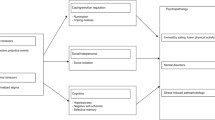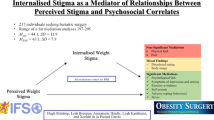Abstract
The prejudice and discrimination that overweight and obese individuals experience as a result of their weight (i.e. weight stigma) often leads to psychological consequences, such as depression. The present study examined whether coping with stigmatizing experiences mediated the relationship between perceived weight stigma and depression among overweight/obese treatment seeking adults. Fifty-four overweight and obese (mean BMI=37.2) weight loss treatment seeking participants (87.3% Caucasian, 79.6% female) participated in the study. Results from this study indicate that greater stigmatizing experiences were significantly related to depression. Both adaptive and maladaptive coping significantly mediated the relationship between weight stigma and depression. Surprisingly however, greater adaptive coping was positively related to depression. Coping responses appear to mediate the association between experiencing bias and discrimination because of one’s weight and adverse psychological outcomes. Results suggest that obese individuals are at considerable risk for psychological complications secondary to weight-based mistreatment by others and their responses to cope with the mistreatment.
Similar content being viewed by others
References
Latner JD, Stunkard AJ. The stigmatization of obese children: 40 years and counting. Obes Res 2001; 11: 452–6.
Andreyeva T, Puhl RM, Brownell KD. Changes in perceived weight discrimination among Americans, 1995–1996 through 2004–2006. Obesity 2008; 16: 1129–34.
Puhl RM, Heuer C. The stigma of obesity: A review and update. Obesity 2009; 17: 941–64.
Carr D, Friedman MA, Jaffe K. Understanding the relationship between obesity and positive and negative affect: the role of psychosocial mechanisms. Body Image 2007; 4: 165–77.
Myers A, Rosen JC. Obesity stigmatization and coping: Relation to mental health symptoms, body image, and self-esteem. Int J Obes 1999; 23: 221–30.
Friedman KE, Reichmann SK, Costanzo PR, et al. Weight stigmatization and ideological beliefs: Relation to psychological functioning in obese adults. Obes Res 2005; 13: 907–16.
Puhl RM, Brownell KD. Confronting and coping with weight stigma: an investigation of overweight and obese adults. Obesity 2006; 14: 1802–15.
Skinner E, Edge K, Altman J, et al. Searching for the structure of coping: A review and critique of category systems for classifying ways of coping. Psychol Bull 2003; 129: 216–69.
National Association for the Advancement of Fat Acceptance. NAAFA policy on adoption discrimination. http://www.naafa.org/documents/policies/adoption.html, 1991.
Tobin DL, Holroyd KA, Reynolds RV, et al. The hierarchical factor structure of the Coping Strategies Inventory. Cogn Ther Res 1989; 13: 343–61.
Faith MS, Leone M, Ayers TS, et al. Weight criticism during physical activity, coping skills, and reported physical activity in children. Pediatrics 2002; 110: e23.
Radloff LS. The CES-D Scale: A self-report depression scale for research in the general population. Appl Psychol Meas 1977; 1: 385–401.
Baron RM, Kenny DA. The moderator-mediator variable distinction in social psychological research: Conceptual, strategic and statistical considerations. J Pers Soc Psychol 1986; 51: 1173–82.
Sobel ME. Asymptotic intervals for indirect effects in structural equations models. In: Leinhart S (Ed) Sociological methodology. San Franscisco, Jossey- Bass, 1982, pp 290–312.
Bower GH. Mood and memory. Am Psychol 1981; 36: 129–48.
Cohen LH, Towbes LC, Flocco R. Effects of induced mood on self-reported life events and perceived and received social support. J Pers Soc Psychol 1988; 55: 669–74.
Author information
Authors and Affiliations
Corresponding author
Rights and permissions
About this article
Cite this article
Koball, A.M., Carels, R.A. Coping responses as mediators in the relationship between perceived weight stigma and depression. Eat Weight Disord 16, 17–23 (2011). https://doi.org/10.1007/BF03327516
Published:
Issue Date:
DOI: https://doi.org/10.1007/BF03327516




